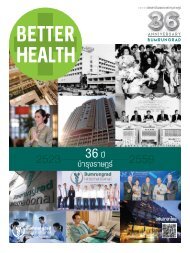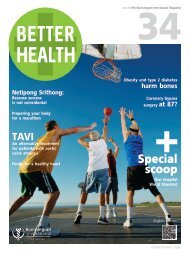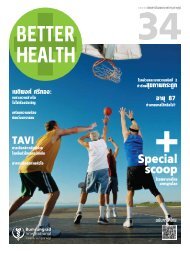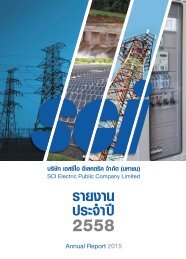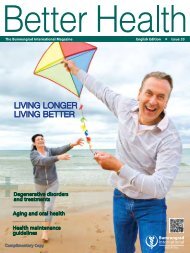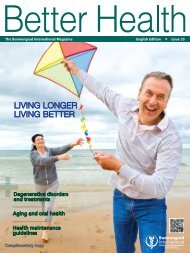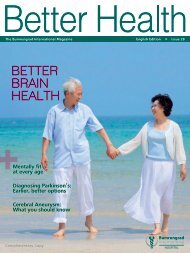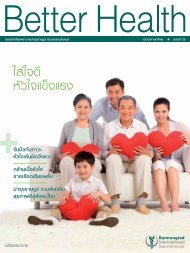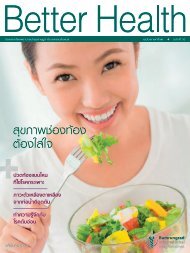Better Health 25 Eng
The magazine for patients and friends of Bumrungrad International Hospital, Thailand.
The magazine for patients and friends of Bumrungrad International Hospital, Thailand.
- TAGS
- bumrungrad
- hospital
- thailand
Create successful ePaper yourself
Turn your PDF publications into a flip-book with our unique Google optimized e-Paper software.
Calcium supplements can offset some of the shortfall.<br />
But they can be difficult for the body to absorb, especially<br />
calcium carbonate; its absorption rate can be as low <br />
as 40 percent. One way to compensate is by dividing<br />
the supplement into smaller doses of 500-600 mg, <br />
and take with meals for better absorption. <br />
<br />
Drug interaction dangers<br />
As many seniors know from personal experience, dealing<br />
with age-related health problems usually means taking<br />
more medications. Prescriptions can come from multiple<br />
sources, with different doctors treating different health<br />
problems, additional advice from caring friends and<br />
relatives on top of one's own research and knowledge. <br />
Besides medicines prescribed by doctors, many seniors<br />
also take various vitamins, supplements and/or traditional<br />
Thai and Chinese remedies. <br />
Unfortunately, many don’t fully understand the potential<br />
dangers of drug interactions occurring when certain<br />
medications are taken together. Dr. Lily notes that, in theory,<br />
medication should be taken only when necessary, and<br />
all things being equal, as seldom as possible. “Seniors<br />
should consult a specialist, either a doctor or pharmacist,<br />
for advice on a medication’s necessity and potential drug<br />
interactions,” she explains. “And at every consultation,<br />
inform your doctor or pharmacist of any medications <br />
you’re currently taking, to avoid possible duplication.”<br />
<br />
NSAIDs caution<br />
Seniors need to be cautious with certain drugs such <br />
as non-steroidal anti-inflammatory drugs (NSAIDs).<br />
NSAIDs including aspirin and ibuprofen can cause serious<br />
side effects, especially perforation of the stomach lining,<br />
kidney problems and high blood pressure. These drugs<br />
should only be taken when necessary under a doctor’s<br />
direction, and prolonged use should be avoided. <br />
Caution should also be taken with cold medicines,<br />
antihistamines and certain types of sleep aids. These<br />
medicines affect the central nervous system and, especially<br />
if taken in too large a dose, can cause blurred vision and<br />
drowsiness, potentially leading to an accident or dangerous<br />
fall. Strong sleeping medications such as diazepam interact<br />
with chemicals in the brain and are known to cause <br />
depression when taken for an extended period of time. <br />
Managing and treating age-associated diseases depends<br />
largely on patients taking an active role in managing<br />
their health. That includes making healthier lifestyle<br />
choices when it comes to nutrition and exercise. Good<br />
mental and emotional health is also important in dealing<br />
with symptoms and managing chronic illnesses. And a<br />
strong support system can make a significant difference.<br />
As Dr. Lily says, “the caring and support of the family’s<br />
younger generations and close friends truly helps seniors<br />
live happier, healthier lives.”<br />
p6 Ad BBL



